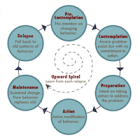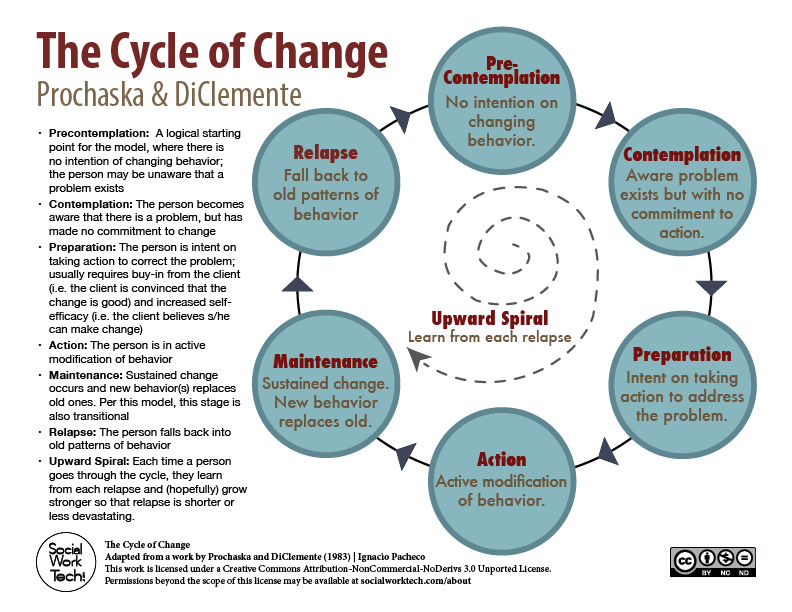Tag Archives:motivational interviewing
Stages of Change share
Once upon a time there were two researchers, Prochaska & DiClemente. (If you can’t already tell, I’m in a bit of a silly mood at the moment.) They were smart people who did research and read other people’s research and put it all together back in 1983 to come up with their Stages of Change model. This model is used heavily in the treatment of addictions but can also be applied to things like the treatment of anxiety and depression…or almost anything really, where change is involved. What they so wisely realized, when it came to making a change in one’s life, was that in addition to understanding the human mind and what can help it to change, you also need to be aware of the person’s readiness to actually do the work to make the change that they are looking for. The stages are Pre-Contemplation (when you don’t even have the desire to make a change), Contemplation (when you recognize that there is a problem and you are starting to consider if you want to make a change), Preparation (when you are starting to gather the resources and information you might need to help you make this change), Action (actively working on making the change happen), and Maintenance (you’ve made the change and can finally start to not work so hard on it, but there may still be some things you need to do to keep this positive change in place).
The Stages of Change model can help us to be patient with ourselves. It can help us to recognize how really ready we (or someone we care about) might actually be to make a significant change in our life. And, it can help us to realize what steps we can take to get ourselves closer to being ready to make this change. There is a therapeutic approach, Motivational Interviewing, that is also heavily rooted in the treatment of addictions but that can be applied in all sorts of other places. Motivational Interviewing is a technique that helps therapists, parents, even friends, to be accepting of the stage of change that a person is in at this moment, and being able to work with them (rather than battle with them) to explore small steps that they might feel comfortable with doing that will get them closer to being ready for change. (I plan to make a post on that at some point but for now, I leave you with doing an internet search.)
Below is an illustration of these stages. I like this illustration in particular because it’s drawn with a spiral rather than in a linear way. This is because there are no rules about the actual order we need to go in as we head towards change. And, sometimes, we even go backwards to an “earlier” level.
Community Reinforcement and Family Training (CRAFT) share
 The CRAFT (Community Reinforcement and Family Training) program (briefly described in the video below) was created by the Center for Motivation and Change teaches people who love a person with an addiction how to walk the delicate balance of loving and accepting your loved one for the entirety of who they are right now, including their challenges, while at the same time, being able to have conversations with them that can gradually open their thinking to the possibility of deciding to make a change. It can also help you to “get off of the roller coaster” that addiction creates in people’s lives. You still have to struggle with the emotional pain of watching your loved one who is still on that roller coaster, but you can create a better life for yourself when you recognize what you can and can’t control. Check out their their 20-Minute Guide. This is a private business that I have no connection to. However, I think that what they have to offer is valuable.
The CRAFT (Community Reinforcement and Family Training) program (briefly described in the video below) was created by the Center for Motivation and Change teaches people who love a person with an addiction how to walk the delicate balance of loving and accepting your loved one for the entirety of who they are right now, including their challenges, while at the same time, being able to have conversations with them that can gradually open their thinking to the possibility of deciding to make a change. It can also help you to “get off of the roller coaster” that addiction creates in people’s lives. You still have to struggle with the emotional pain of watching your loved one who is still on that roller coaster, but you can create a better life for yourself when you recognize what you can and can’t control. Check out their their 20-Minute Guide. This is a private business that I have no connection to. However, I think that what they have to offer is valuable.
This model is based on the same science that has created a therapeutic approach called “Motivational Interviewing” that is used throughout the professional substance abuse field. It is a powerful tool that needs to be applied with patience and acceptance. It recognizes the reality that the person with the addiction is truly the only one that can decide to enter treatment and commit to the work that they need to do to stop their substance abuse. This is not a free service, but it may be worth the money. It’s so easy to fall into unpleasant power struggles with a loved one in these situations. These techniques teach you how to be a power struggle ninja and still feel like you are doing what you can to encourage change.



